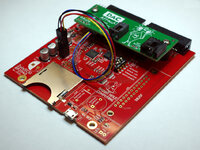saybur
Well-known member
Over the past few weeks I've been doing some tinkering with ZuluSCSI boards and figured out a way to get a ZuluSCSI RP2040 to output 44.1KHz S/PDIF audio over one of the expansion pins. Combined with some awesome development work from @rabbitholecomputing to add full BIN/CUE support for CD-ROMs, this means that ZuluSCSI RP2040s now have experimental support for audio CDs, including the mixed-mode disks used by lots of games and other software.
To actually do anything useful with the S/PDIF signal it needs to get piped into an appropriate digital-analog converter to create the line-level audio used by retro Macs and PC sound cards. I spun up a board called "DAC Attack!" for this: it's a simple little DAC designed to be easy to mount on top of a ZuluSCSI and connect to its expansion header. Here's a picture of one in action:

Right now this hardware is solidly in 'early adopter' territory: at present nobody makes these boards, my prototypes have only received light testing, and I lack the equipment to do a rigorous analysis of how high-quality the audio output is. That said, the design is available under a CERN Open Hardware License (strongly reciprocal), and can be almost 100% assembled by JLCPCB (and likely others). Hopefully this thing proves to be useful, or barring that, at least interesting! Check it out at https://github.com/saybur/dac-attack.
Check it out at https://github.com/saybur/dac-attack.
Since the output from the ZuluSCSI is just normal TTL S/PDIF there are other ways to get at the audio as well. During testing I used a common optical audio module, an Everlight PLT237/T10WH, which can be directly attached to the relevant pins on the ZuluSCSI. That produces an optical link that you can put into an appropriate DAC, including some cheap ones on Amazon. I can provide more info about this if anyone is interested.
Audio support currently requires a separate firmware file, which is available at https://github.com/ZuluSCSI/ZuluSCSI-firmware/releases with the "ZuluSCSI_RP2040_Audio" prefix. As mentioned this is EXPERIMENTAL and does require modding your boards. It also isn't perfect yet: activity on other virtual volumes can cause the audio to stutter a bit, though hopefully that can be improved in the future. If you try any of this, please post about your experience, I'd love to hear how things go!
To actually do anything useful with the S/PDIF signal it needs to get piped into an appropriate digital-analog converter to create the line-level audio used by retro Macs and PC sound cards. I spun up a board called "DAC Attack!" for this: it's a simple little DAC designed to be easy to mount on top of a ZuluSCSI and connect to its expansion header. Here's a picture of one in action:

Right now this hardware is solidly in 'early adopter' territory: at present nobody makes these boards, my prototypes have only received light testing, and I lack the equipment to do a rigorous analysis of how high-quality the audio output is. That said, the design is available under a CERN Open Hardware License (strongly reciprocal), and can be almost 100% assembled by JLCPCB (and likely others). Hopefully this thing proves to be useful, or barring that, at least interesting!
Since the output from the ZuluSCSI is just normal TTL S/PDIF there are other ways to get at the audio as well. During testing I used a common optical audio module, an Everlight PLT237/T10WH, which can be directly attached to the relevant pins on the ZuluSCSI. That produces an optical link that you can put into an appropriate DAC, including some cheap ones on Amazon. I can provide more info about this if anyone is interested.
Audio support currently requires a separate firmware file, which is available at https://github.com/ZuluSCSI/ZuluSCSI-firmware/releases with the "ZuluSCSI_RP2040_Audio" prefix. As mentioned this is EXPERIMENTAL and does require modding your boards. It also isn't perfect yet: activity on other virtual volumes can cause the audio to stutter a bit, though hopefully that can be improved in the future. If you try any of this, please post about your experience, I'd love to hear how things go!
